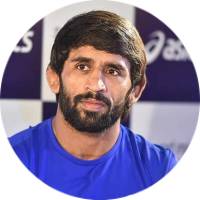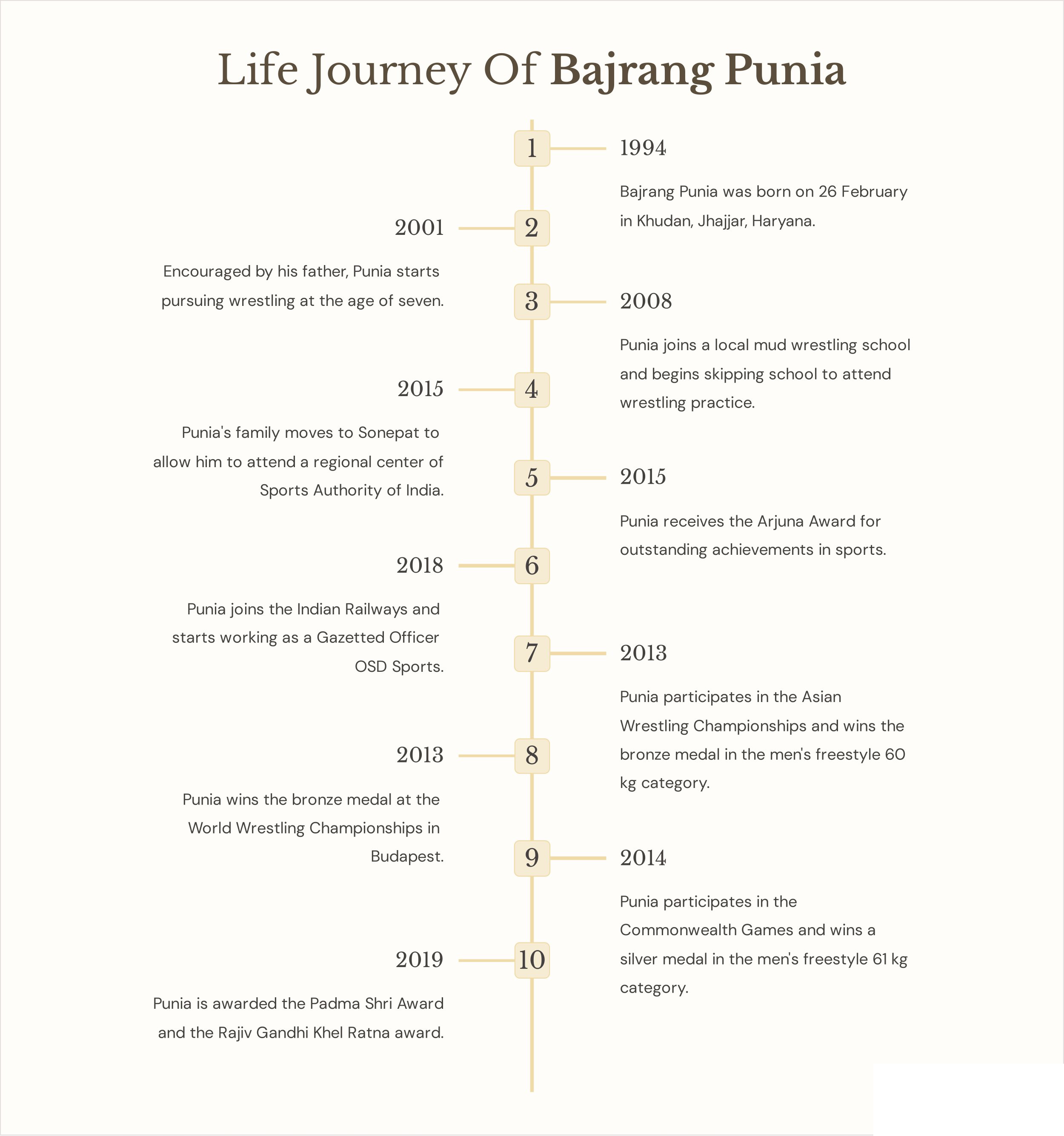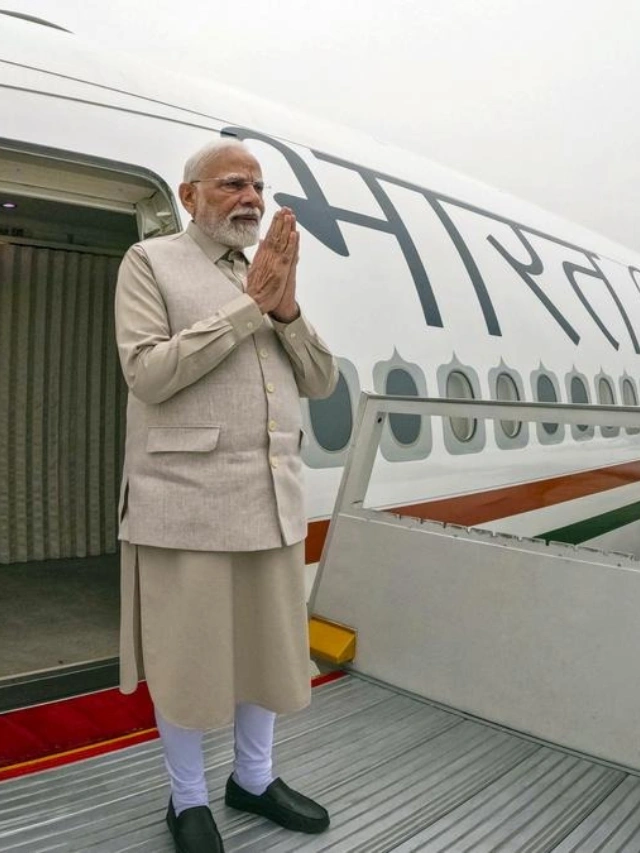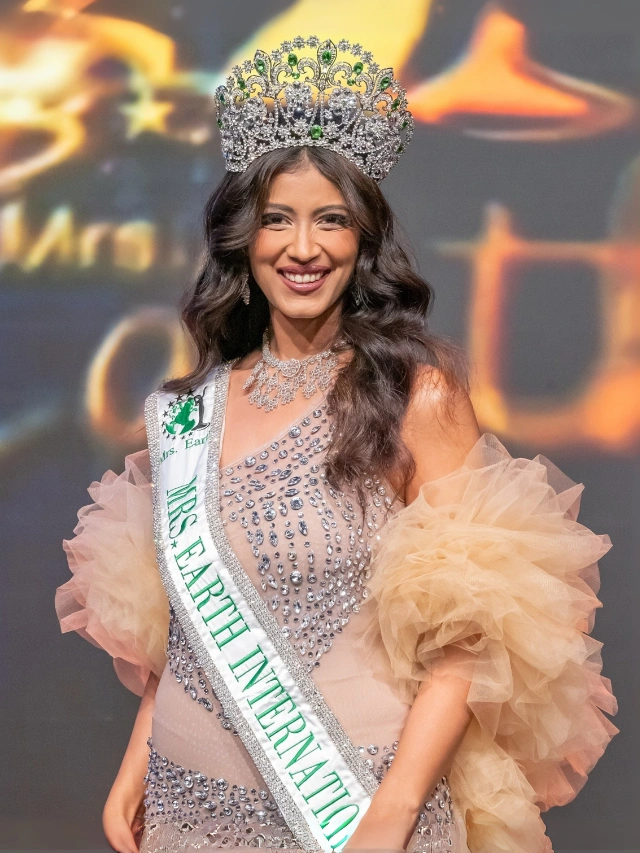Bajrang Punia
Bajrang Punia made history as the first Indian wrestler to reach world No. 1 ranking in any category. This champion wrestler holds another remarkable record – he remains the only Indian to win four medals at the World Wrestling Championships.
Punia’s story began in Jhajjar, Haryana, where he couldn’t afford expensive sports gear. Yet this didn’t stop him from discovering his passion for wrestling and rising to global success.
CEO’s | Actors | Politicians | Sports Stars
Punia’s Olympic dream came true at Tokyo 2020 when he claimed the bronze medal in the 65-kg category. He dominated Kazakhstan’s Daulet Niyazbekov with an impressive 8-0 victory.
His achievement shines even brighter because he fought through a serious knee injury to reach the podium. Punia’s rise from modest beginnings to becoming one of India’s most decorated wrestlers showcases his exceptional talent and steadfast dedication to wrestling.

Early life and the making of a wrestler
Bajrang Punia village name and family background
Born in rural Haryana, Bajrang Punia came into this world on February 26, 1994, in Khudan village of Jhajjar district. This region stands as the birthplace of Indian wrestling and has produced many champions over the years. Wrestling runs deep in Punia’s family – his father Balwan Singh Punia was a wrestler who taught his son the values of hard work and determination from day one. His mother, Kamla Devi, has stood by his side throughout his experience, supporting him since his early years.
Financial constraints played a big role in shaping Punia’s sports choices. His family couldn’t afford expensive equipment needed for sports like cricket or badminton. He naturally turned to free-hand sports popular in his village – mainly kabaddi and wrestling – which needed minimal money to practice. This limitation actually set him on the path that made him one of India’s most celebrated wrestlers.
Starting wrestling at age 7
The wrestling journey started remarkably early for Bajrang Punia. His father encouraged him to step into the wrestling arena at just seven years old. He trained at Virender Kumar’s akhada (traditional wrestling gymnasium) near his home in Jhajjar. The local wrestling area soon became like a second home as he showed natural talent for the sport.
Early passion for wrestling shone through as young Bajrang put training above school. He often missed classes to practice wrestling, which showed his complete focus on becoming skilled at the sport. His father Balwan’s response to finding out was balanced – he wanted his son to get basic education but never forced him against his wishes. “He wouldn’t prank around a lot and simply did his task. But he didn’t want to study and had told me about it. He had told me from the beginning only that he wanted to do wrestling,” his father later recalled.
Training at Chhatrasal Stadium
The pivotal move that changed Bajrang’s wrestling path happened in 2008 when he joined Delhi’s prestigious Chhatrasal Stadium. Coach Ramphal Mann’s guidance helped turn his raw talent into world-class skill. This stadium holds a special place in Indian wrestling history and has produced Olympic medalists like Sushil Kumar and Yogeshwar Dutt.
Meeting his mentor changed everything for the young wrestler. At 14, while training at Chhatrasal, Bajrang met Olympic medalist Yogeshwar Dutt, who became his mentor and sparring partner. This relationship shaped his wrestling style and career path. Sushil Kumar’s achievements also inspired him, as Bajrang hoped to match his success on the world stage.
Influence of his father and rural upbringing
Paternal sacrifice built the foundation of Bajrang’s wrestling career. His father’s unfulfilled dreams of bringing glory to his country led him to introduce Bajrang to wrestling at nine in Khudan village’s local akhada. Balwan would ride his bicycle instead of taking the bus to save money for his son’s nutrition – something he never had during his own wrestling days. These sacrifices helped Bajrang grow into a world-class athlete.
Rural influences molded Bajrang’s approach to wrestling and life. His village upbringing exposed him to traditional wrestling culture early on. He absorbed the discipline, perseverance, and grit that rural athletes are known for. His family’s commitment reached new heights in 2015 when they moved to Sonepat so Bajrang could train at the Sports Authority of India’s regional center. This move showed their steadfast dedication to his potential.
Fulfilling dreams became Bajrang’s mission, especially his father’s unfinished wrestling story. “I couldn’t continue with wrestling as the situation in my family was tough but Bajrang fulfilled my dreams. I was passionate about wrestling and I was the one to bring him into the sport,” Balwan Punia told interviewers. Through his success, Bajrang has carved his own path while making his father’s interrupted dreams come true, creating a touching story of determination across generations in Indian wrestling.
Rise through national and international ranks
First medals at Asian and World Championships
The international trip for Bajrang Punia started in 2013, marking his arrival on the global wrestling stage. Punia won his first major international medal at the Asian Wrestling Championship in New Delhi. He secured a bronze in the men’s freestyle 60 kg category. He lost a close semi-final bout 3–1 to North Korea’s Hwang Ryong-hak after beating Japan’s Shogo Maeda and Iran’s Morad Hassan in earlier rounds.
World championship success came quickly for the young wrestler. He went to Budapest, Hungary and won a bronze medal at the 2013 World Wrestling Championships. He showed great resilience by qualifying through the repechage round after losing to Bulgaria’s Vladimir Dubov in the Round of 32. He then beat Japan’s Shogo Maeda (through walkover) and Romania’s Ivan Guidea with a commanding 10–3 score to reach the bronze medal bout. His final match ended with a convincing 9–2 win against Mongolia’s Enkhsaikhany Nyam-Ochir.
Breakthrough at 2014 Commonwealth and Asian Games
Commonwealth glory came to Punia in 2014 at the Glasgow Games with a silver medal in the men’s freestyle 61 kg category. He showed his growing technical skills throughout the tournament. He beat England’s Sasha Madyarchyk 4–0 in the Round of 16, South Africa’s Marno Plaatjies 4–1 in the quarter-finals, and Nigeria’s Amas Daniel 3–1 in the semi-finals. He ended up losing 1–4 to Canada’s David Tremblay in the final, but this silver medal proved he was a rising star in international wrestling.
Asian Games podium success followed in Incheon, South Korea. He grabbed another silver medal in the Men’s freestyle 61 kg category. He beat Mongolia’s Tuvshintulga Tumenbileg (3–1), Tajikistan’s Farkhodi Usmonzoda (4–1), and Japan’s Noriyuki Takatsuka (4–1) on his way to the final. He lost 1–3 to Iran’s Masoud Esmaeilpoorjouybari in the gold medal match. These back-to-back silver medals at major international competitions proved his worth on the global stage.
Consistent performance in 2017–2019
Dominant 2017 campaign took Punia to new heights in his wrestling career. He won gold at the Asian Wrestling Championship in New Delhi in May. His victory on home soil was special as he beat Korea’s Seungchul Lee 6-2 in an exciting comeback final. He was down 0-2 at the break but scored six straight points in the second half to win. This win kicked off an amazing year that included gold medals at the Commonwealth Wrestling Championship (65 kg) and Asian Indoor and Martial Arts Games (70 kg).
Historic 2018 performances made Punia one of India’s greatest wrestlers. He started by winning gold at the Commonwealth Games in Australia, beating Wales’ Kane Charig by technical superiority. He added a bronze at the Asian Wrestling Championship and a gold at the 2018 Asian Games. His silver at the 2018 World Championships helped him claim the World No. 1 ranking in the 65 kg category.
Record-breaking 2019 saw Punia reach even greater heights. He won gold at the 2019 Asian Championship. His biggest achievement came at the 2019 World Wrestling Championships where he won bronze and qualified India for the Tokyo 2020 Olympics in the 65 kg freestyle wrestling event. This medal made him the first Indian to win four World Championship medals. He also became the first Indian wrestler to be ranked world No. 1 in any category.
Bajrang Punia at the Olympics
Bajrang Punia Olympic medal at Tokyo 2020
Historic achievement marked Bajrang Punia’s Olympic debut at Tokyo 2020. He secured a bronze medal in the men’s freestyle 65kg category. His dominant 8-0 victory over Kazakhstan’s Daulet Niyazbekov in the bronze medal match showed his technical superiority on the biggest stage. This win made Punia the sixth Indian wrestler to earn an Olympic medal. He joined the elite group of KD Jadhav, Sushil Kumar, Yogeshwar Dutt, Sakshi Malik, and Ravi Kumar Dahiya. This achievement created another milestone as it became only the second time that two Indian wrestlers won medals in the same Olympic Games.
Olympic experience started with a close call against Kyrgyzstan’s Ernazar Akmataliev. The match ended with both wrestlers scoring three points each. Punia won because he had the highest-scoring move. He showed growing confidence in the quarterfinals with a commanding win over Iran’s Morteza Ghiasi. He pinned his opponent after a strategic takedown. His gold medal dreams stopped in the semifinals when Azerbaijan’s Haji Aliyev, a three-time world champion, defeated him 12-5.
Medal match became Punia’s moment of redemption. He entered the bronze medal contest with fresh determination and executed a perfect game plan against Niyazbekov. He took a careful 2-0 lead in the first three minutes. Then he released his technical arsenal in the second half of the bout. He scored six more points through multiple takedowns to grab the 8-0 victory. The win tasted sweet because Niyazbekov had beaten Punia in the 2019 World Championships semifinals.
Challenges faced during the Olympics
Severe injury affected Punia’s Olympic campaign by a lot. He hurt his right knee ligament during the Ali Aliyev tournament in Russia in June 2021. This bad injury forced him to quit that match and raised serious doubts about his Olympic chances. In spite of that, Punia stood firm. “There is pain in the right knee, the doctor had advised me to rest, but I couldn’t afford to take rest as every athlete wants to play in the Olympics for the country,” he later revealed.
Rehabilitation struggle defined Punia’s Olympic preparation. The injury kept him off the mat for almost 25 days before Tokyo 2020. His doctors in India wanted him to come home from Russia to get treatment. Punia chose his Olympic dream instead. “I asked doctors to tell me about the rehab and I will do so,” he explained, showing his steadfast dedication. He competed with protective strapping around his knee during his Olympic matches to avoid more damage.
Brave decision ended up making the difference for Punia’s medal chances. He studied his earlier performances where the knee strapping limited his movement. Then he made a bold choice for the bronze medal match: “In the last bout, I told them that I will not get the strapping and if the injury gets worse then I will take rest. For me the medal was more important then, injury could be treated”. This risk paid off brilliantly as he moved better and controlled his opponent. His coach said later, “I love this bronze much more than if he had won silver. The silver would have been a medal from a match he would have lost. But this bronze medal was so difficult to win”.
Preparation for Bajrang Punia Paris Olympics 2024
Olympic aspirations stay strong for Punia despite many challenges. People welcomed him as a hero after his Tokyo success. His father Balwan shared Punia’s future dreams: “Bajrang had told me that day, ‘Papa, at the Paris 2024 Olympics, I will change the color of the medal and if the countrymen keep supporting me in the same way, then I can bring home plenty more medals'”. These words show his drive to do better than his bronze medal performance.
Training regimen for Paris includes hard preparation abroad. After Tokyo, Punia took time to heal his knee fully before starting his training again. He later held training camps in Moscow, Russia. There he focused on getting stronger and improving techniques against good sparring partners. Unlike his last Olympic cycle, Punia wants an Indian coach now: “Foreign coaches want me to spend most of my time in their country. I am willing to spend half my time outside but then no one is willing to come to India. So I have decided to train with an Indian coach”.
Qualification hurdles have shown up on Punia’s road to Paris. The National Anti-Doping Agency (NADA) suspended him in April 2024. He had refused to give a urine sample during Olympic qualifier selection trials. The United World Wrestling (UWW) also suspended him after that. This made his Olympic qualification chances harder. Punia has challenged these suspensions in court. His Paris 2024 participation remains unclear as he fights legally while keeping up his training.
Personal life and values
Bajrang Punia wife name and marriage to Sangeeta Phogat
Wrestling romance sparked between Bajrang Punia and Sangeeta Phogat at a wrestlers’ training camp in Sonepat, Haryana. The couple planned their wedding after the Tokyo Olympics. COVID-19 pandemic made them change their plans, and they got married in November 2020. Sangeeta was 22 years old at the time. She is the youngest sister among wrestling siblings Geeta and Babita Phogat, and MMA star Ritu Phogat. Their wedding stood out with a special tradition – they took eight pheras instead of the usual seven. The eighth phera honored the “Beti Bachao Beti Padhao” initiative.
Balancing personal and professional life
Unconventional married life shapes their relationship as professional athletes. “We’re sportspeople, not a normal couple,” Bajrang says. “For us, training and achieving goals are important”. Their shared profession brings its own set of challenges and benefits. They train at different locations – Bajrang in Sonipat and Sangeeta in Lucknow. Back-to-back competitions leave little time for vacations together. “We can’t go on vacations together because our competitions happen back-to-back and we can’t miss even a day of training. But we don’t mind. We are focused on being athletes”.
Mutual support system makes their bond stronger both in sport and life. “When your partner is in the same profession as you, you exchange ideas with each other. Your biggest critic is right there with you,” Bajrang explains. This support proved crucial when Sangeeta faced a severe knee injury that kept her away from the sport for almost four years. Bajrang stood by her side through rehabilitation, sharing his athletic experience. “I salute her resilience,” he proudly states. “Despite all the odds, she kept training and now has qualified for the World Championships”.
His views on discipline and mental strength
Disciplined approach defines Bajrang’s outlook on wrestling and life. “We are dedicated to our sport because whatever we are today is because of wrestling,” he states. Bajrang values family time and maintains strong bonds with his loved ones. His balanced life-work point of view goes beyond wrestling—he follows “corporate world rules and regulations” while keeping a “perfect work-life balance”.
Trust foundation serves as the life-blood of his relationship values. “It’s all about trust. We have to back each other’s decisions and stay faithful to one other. That’s the only way one can sustain a successful relationship,” Bajrang believes. Sangeeta shares this belief: “If you believe in yourself and your partner, you will have a long-lasting relationship, irrespective of the problems and difficulties you face”. Beyond his wrestling career, Bajrang shows his “social worker by nature” personality. He motivates young people to take up sports and helps needy social groups.
Activism and political journey
Role in 2023 wrestlers’ protest
Unprecedented protest began in January 2023 as Bajrang Punia staged a sit-in at Jantar Mantar, New Delhi with fellow wrestlers Vinesh Phogat and Sakshi Malik. Their movement called out Brij Bhushan Sharan Singh, BJP MP and then Wrestling Federation of India (WFI) president, over sexual harassment allegations against female wrestlers. The accusations were serious and included groping, stalking, intimidation, and demands for sexual favors in exchange for professional help.
Protest timeline had several phases. The wrestlers paused their January demonstration after government promises to break down the matter. They returned to protest on April 23, 2023, because authorities failed to act. The movement grew stronger with support from opposition parties, farm unions, and women’s organizations. It became one of India’s most powerful athlete-led demonstrations.
Brave stance defined Punia’s response during this challenging time. “What are we supposed to do with the medals if this is how we are going to be treated?” he asked after Delhi police confronted him. The protesters announced their shift to legal channels from public demonstrations on June 25, 2023.
Joining Indian National Congress in 2024
Political entry came on September 7, 2024, when Punia joined the Indian National Congress with Vinesh Phogat before Haryana’s Legislative Assembly election. He made this choice after meeting Rahul Gandhi, then Leader of Opposition.
Strong statement marked his political beginning. “What BJP IT Cell is saying today that we just wanted to do politics… We had written to all women BJP MPs to stand with us but they still didn’t come,” Punia stated clearly. He added, “We will work hard to strengthen the Congress party and the nation”.
Working President of All India Kisan Congress
Swift appointment came right after his political debut. The party named Punia Working Chairman of the All India Kisan Congress, their farmers’ wing, within hours of his joining.
Official charge happened on October 22, 2024, at Congress headquarters in New Delhi. The event saw senior party leaders including National President Sukhpal Singh Khaira, General Secretary Kumari Selja, and former Union Minister Chaudhary Birendra Singh.
Focused mission drives his new role. Senior Congress leaders say Punia will “raise the voice of the farmers and laborers of the country”. Kumari Selja believes that “the youth and farmers of the country have high expectations from Punia”.
Awards, recognition, and legacy
Bajrang Punia awards and honors
Bajrang Punia’s remarkable career shines with prestigious honors. The wrestler earned the Arjuna Award in 2015 for his outstanding sports performance. The Government of India presented him with the Padma Shri Award in 2019, which stands as India’s fourth-highest civilian award. He also received the Rajiv Gandhi Khel Ratna Award that year, the highest sporting honor in the country. The FICCI India Sports Award in 2020 added to his growing list of accolades.
Punia’s bronze medal at the Tokyo Olympics brought substantial rewards. The Government of India rewarded him with ₹30 lakh, and Haryana’s government gave him a much larger sum of ₹2.5 crore. The Board of Control for Cricket in India and Indian Olympic Association each contributed ₹25 lakh to recognize his Olympic success.
Bajrang Punia gold medals and total medal count
Punia’s medal collection tells a story of excellence. He stands alone as India’s only wrestler with four World Wrestling Championships medals. His World Championship achievements include a silver (2018) and three bronze medals (2013, 2019, 2022), making him India’s most successful wrestler at this elite competition. The wrestler dominated his opponent to win gold in the men’s freestyle 65 kg category at the 2018 Commonwealth Games.
His golden run continued as he defeated Japanese wrestler Takatani Daichi 11-8 to claim the 2018 Asian Games gold medal. Multiple gold medals at Asian Championships (2017, 2019) showcase his consistency. These achievements led to his selection as India’s second-seeded wrestler for the Tokyo Olympics.
Impact on Indian wrestling and future prospects
Punia’s legacy in Indian wrestling breaks new ground. He made history by becoming the first Indian wrestler to reach world No. 1 ranking in any category. This achievement changed how the world views Indian wrestling. His Olympic medal victory despite a severe knee injury serves as inspiration to young wrestlers nationwide.
Punia’s role as a mentor shapes Indian wrestling’s future. To cite an instance, see his influence on younger wrestler Deepak Punia, who grew up looking up to him. Deepak shares: “Whenever I am in doubt or have any problem, I talk to him about it. He is always there to help and motivate me”. Punia’s contributions go beyond personal achievements. He has helped establish India as a wrestling powerhouse and elevated the sport’s status across the country.
Key Takeaways
The Experience of Perseverance
From humble beginnings to Olympic glory, Bajrang Punia’s wrestling career shows the power of determination against all odds. A small village in Haryana saw the rise of this wrestling champion. Punia’s family had limited means, yet he grew from a seven-year-old training in local akhadas to become the first Indian wrestler ranked world No. 1. His bronze medal at Tokyo 2020 proves his extraordinary resilience, especially since he competed with a serious knee injury. He has collected an impressive array of medals at Commonwealth Games, Asian Games, and World Championships that cement his place among India’s greatest athletes.
Values Beyond the Mat
Personal integrity defines how Punia approaches wrestling and life outside the arena. His marriage to fellow wrestler Sangeeta Phogat shows their shared love for sporting excellence and strong foundation of trust and support. His disciplined lifestyle, balanced view, and craft dedication help him overcome many challenges. The 2023 wrestlers’ protest revealed his courage extends beyond competitive bouts, as he stood firm against perceived injustice.
Legacy and Future Effect
Trailblazing achievements shape Punia’s lasting mark on Indian wrestling. He stands alone as the only Indian with four medals at World Wrestling Championships and the first to reach world No. 1 ranking. This success changed how the world sees Indian wrestling. Recent suspensions might affect his Paris 2024 Olympic qualification, yet he continues to guide the next generation through his resilience and mentorship. His new role as Working Chairman of the All India Kisan Congress opens fresh opportunities where he wants to represent farmers’ interests with his signature determination.
A Continuing Story
Punia’s remarkable experience evolves as he directs his path through athletic and political arenas. The road to Paris 2024 presents major hurdles, but his history suggests counting him out would be unwise. The same athlete who fought through a severe knee injury for Olympic bronze has shown exceptional mental strength. His influence on Indian sports and society will grow through future athletic achievements, political advocacy, and young wrestler mentorship. Punia’s story keeps unfolding, and his impact will echo for years to come.

Also Read: Journey of Anup Kumar, Avani Lekhara
FAQ
Who is Bajrang Punia's wife?
Bajrang Punia is married to fellow Indian wrestler Sangeeta Phogat. Born on March 5, 1998, Sangeeta is a member of the renowned Phogat wrestling family. The couple tied the knot on November 25, 2020, in Balali, Haryana. Their union symbolizes the coming together of two prominent wrestling families in India.
What Olympic medals has Bajrang Punia won?
Bajrang Punia secured a bronze medal in the men’s freestyle 65 kg wrestling category at the 2020 Tokyo Olympics. Despite a knee injury during the competition, he showcased resilience and determination. In the bronze medal match, Bajrang delivered a dominant performance, defeating Kazakhstan’s Daulet Niyazbekov with a decisive 8–0 scoreline. This achievement marked a significant milestone in his career, adding to India’s wrestling accolades on the Olympic stage.
How old is Bajrang Punia?
Born on February 26, 1994, Bajrang Punia is currently 31 years old. Hailing from Khudan village in Jhajjar district, Haryana, he began his wrestling journey at a young age, inspired by his father’s involvement in the sport. Over the years, Bajrang has risen to prominence in international wrestling, earning multiple accolades and representing India on prestigious platforms, including the Olympics and World Wrestling Championships.
What are Bajrang Punia's major wrestling achievements?
Bajrang Punia has an illustrious wrestling career with numerous accolades. He is the only Indian wrestler to have won four medals at the World Wrestling Championships. His achievements include a gold medal at the 2018 Asian Games in Jakarta and a silver medal at the 2019 World Wrestling Championships in Nursultan. Additionally, he clinched a bronze medal at the 2020 Tokyo Olympics in the men’s freestyle 65 kg category. These accomplishments have solidified his reputation as one of India’s premier wrestlers.
How has Bajrang Punia performed in the Asian Games?
Bajrang Punia has had notable performances in the Asian Games. In the 2014 Incheon Asian Games, he secured a silver medal in the men’s freestyle 61 kg category. He elevated his performance in the 2018 Jakarta Asian Games, clinching the gold medal in the 65 kg category, marking a significant highlight in his career. However, during the 2023 Asian Games in Hangzhou, Bajrang faced challenges and did not secure a medal, losing the bronze medal bout to Japan’s Kaiki Yamaguchi in the men’s 65 kg wrestling division.
What is Bajrang Punia's height?
Bajrang Punia stands at a height of 5 feet 5 inches (1.66 meters). His stature, combined with rigorous training and technique, has contributed to his success in the 65 kg weight category in freestyle wrestling. His physical attributes, complemented by his dedication, have made him a formidable opponent on the mat.
Are Bajrang Punia and Deepak Punia related?
Despite sharing the same surname and both being prominent Indian wrestlers, Bajrang Punia and Deepak Punia are not related by blood. The surname “Punia” is common in Haryana, and while both athletes hail from this state and have made significant contributions to Indian wrestling, their familial backgrounds are distinct. Their shared dedication to the sport has, however, brought them together in various national training camps and competitions.
What is Bajrang Punia's constituency?
As of February 2025, Bajrang Punia has not contested any electoral seat and, therefore, does not represent a specific constituency. He joined the Indian National Congress in September 2024 and was appointed as the Working President of the All India Kisan Congress, focusing on agricultural issues rather than electoral politics. While he has been actively involved in advocating for farmers’ rights and athlete welfare, he has not announced plans to contest elections from any constituency. In contrast, fellow wrestler Vinesh Phogat contested and won from the Julana constituency in the 2024 Haryana Assembly elections.
What is Bajrang Punia's net worth?
As of 2024, Bajrang Punia’s estimated net worth is around $2 million (approximately ₹15 crore INR). His income sources include earnings from wrestling championships, government rewards, and his position as a Gazetted Officer (OSD Sports) with Indian Railways. His consistent performances and endorsements have contributed significantly to his financial standing.
How did Bajrang Punia perform at the Tokyo Olympics?
At the 2020 Tokyo Olympics, Bajrang Punia showcased commendable resilience. Competing in the men’s freestyle 65 kg category, he advanced through the initial rounds with determination. After a setback in the semifinals, Bajrang faced Kazakhstan’s Daulet Niyazbekov in the bronze medal match. Demonstrating superior technique and control, he secured an 8–0 victory, earning the bronze medal and adding a significant accolade to his wrestling career.




